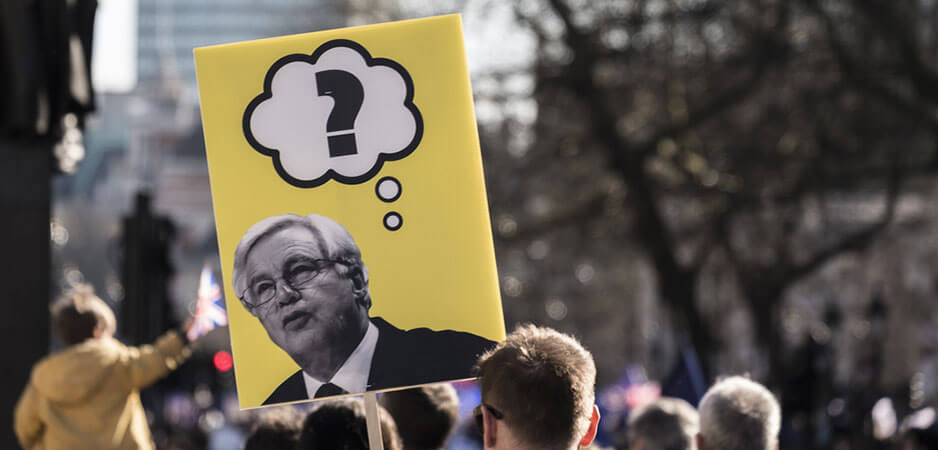With nine months to go before the deal is finalized, the history of Brexit continues.
Brexit Secretary of State David Davis is busy defending the interests of Britain and, perhaps more furiously, those of a dot on the map called the “City” (of London). The Square Mile, as it is familiarly termed, has for at least two centuries been the hub of European if not global finance. As a result, the City established an unassailably dominant position in the supply of financial services for the whole of Europe. Unassailable at least so long as London remained in Europe.
Since the Brexit vote, the British government has demonstrated its wish to retain London’s virtual control over Europe’s financial services industry. It has engaged an effort to achieve what it calls a “bespoke deal” with the paradoxical aim of avoiding the evils of banking “fragmentation,” while at the same time the government merrily pursues its plan to fragment the European Union.
From The Guardian, we learn that Davis describes his proposed bespoke deal as a “Canada plus plus plus,” which would be similar to the EU trade deal with Canada “plus the best of Japan, the best of South Korea and the bit that is missing, which is the services.”
Here is today’s 3D definition:
The bit (that is missing):
The essential part
Had Davis showed the slightest sense of true British irony, his “bit that is missing” would deserve to be called by the name of the rhetorical trope it clearly appears to be, litotes or understatement. This may in fact have been his intent. But there is a point at which irony disappears under the weight of blatant hypocrisy.
Contextual note
Some are calling the quest for a bespoke deal an example of cakeism: “the conviction that you can have your cake and eat it.” But in rhetorical terms you could say that following his “plus plus plus,” Davis’s “the bit that is missing” takes the cake. In a scathing article, Jonathan Lis, director of the think tank British Influence, points out: “It has been evident for many months that the government is bluffing, and is developing no substantive contingency plans for the worst-case scenario.” He adds that “the government is addicted to its own mistakes.” And a cheap rhetorical device like litotes won’t help to cure the addiction.
Historical note
With no interest in losing its privileged place in the European economy, London itself voted massively in favor of Remain, but to no avail. The City was so shocked by the result of the Brexit vote that for a brief moment there was talk of finding a way for London to remain in the EU even after Britain’s departure, as a city state.
But the history of Brexit continues. We have another nine months to go before the deal is finalized. And all we know today is that the “plus plus plus” solution with its “bit that is missing” is, in the words of Hamlet, the government’s current “consummation devoutly to be wished.”
*[In the age of Oscar Wilde and Mark Twain, another American wit, the journalist Ambrose Bierce, produced a series of satirical definitions of commonly used terms, throwing light on their hidden meanings in real discourse. Bierce eventually collected and published them as a book, The Devil’s Dictionary, in 1911. We have shamelessly appropriated his title in the interest of continuing his wholesome pedagogical effort to enlighten generations of readers of the news.]
The views expressed in this article are the author’s own and do not necessarily reflect Fair Observer’s editorial policy.
Photo Credit: Gina Power / Shutterstock.com
Support Fair Observer
We rely on your support for our independence, diversity and quality.
For more than 10 years, Fair Observer has been free, fair and independent. No billionaire owns us, no advertisers control us. We are a reader-supported nonprofit. Unlike many other publications, we keep our content free for readers regardless of where they live or whether they can afford to pay. We have no paywalls and no ads.
In the post-truth era of fake news, echo chambers and filter bubbles, we publish a plurality of perspectives from around the world. Anyone can publish with us, but everyone goes through a rigorous editorial process. So, you get fact-checked, well-reasoned content instead of noise.
We publish 2,500+ voices from 90+ countries. We also conduct education and training programs
on subjects ranging from digital media and journalism to writing and critical thinking. This
doesn’t come cheap. Servers, editors, trainers and web developers cost
money.
Please consider supporting us on a regular basis as a recurring donor or a
sustaining member.
Will you support FO’s journalism?
We rely on your support for our independence, diversity and quality.






